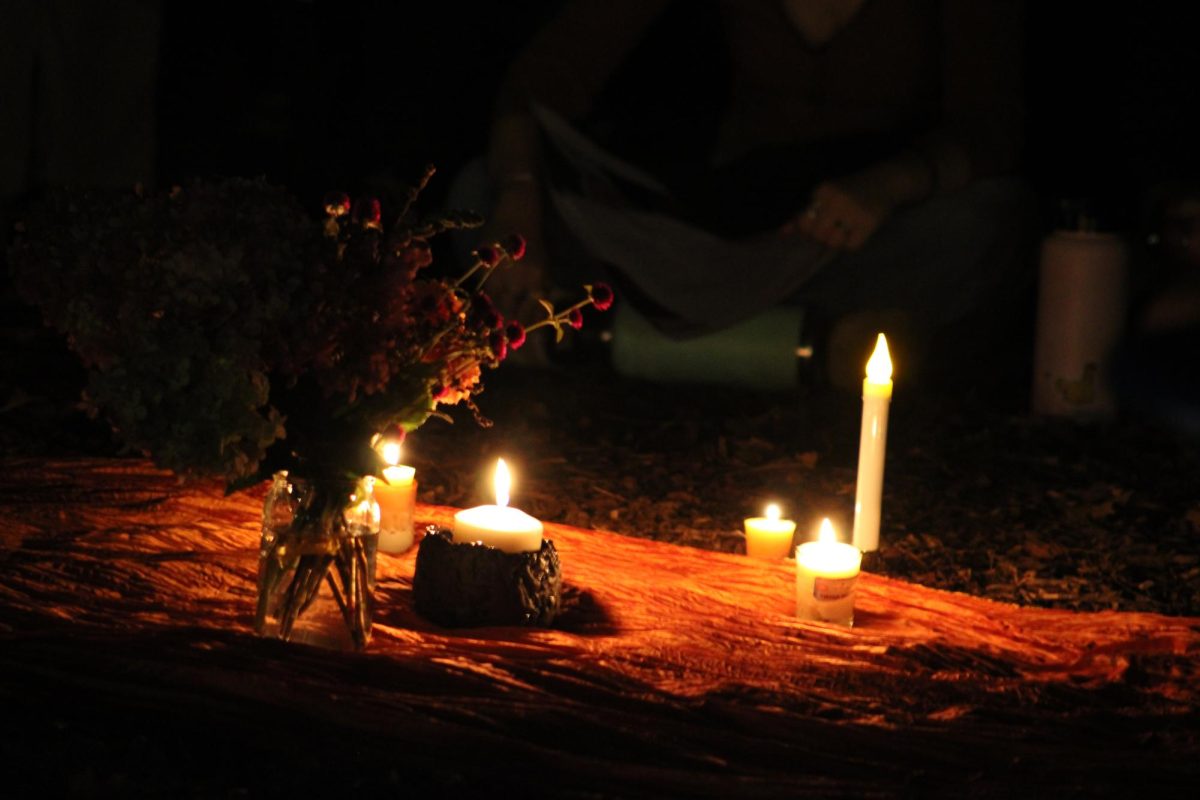On Thursday, Oct. 26 at 6 p.m., students and Amherst residents came together at Amherst Town Common to speak, mourn and pray in solidarity amid Gaza and West Bank bombings. Several of those in support wore keffiyehs, a black and white headscarf popularized in the 1930s Arab Revolt often worn in support of Palestine.
The West Bank is a landlocked area that makes up most of the Palestinian Territory. The recent Israeli air strikes increased Palestinian casualties according to Al Jazeera reporters. Wikalat al-Anba al-Filastinija, or the Palestinian News Agency, reported that at least 15 people were killed in air raids on the city of Khan Younis in southern Gaza, at least 10 people were killed in a strike on a four-story house in the al-Zaytoun neighborhood in southeast of Gaza City and eight others were killed in air raids on a Nuseirat refugee camp in central Gaza.
Leyla Moushabeck, a community member and daughter of Michael Moushabeck, said that she had a distant family in the West Bank and felt privileged to live, watch and fight these issues at hand from a distance.
“It’s a really scary time…for any parent, to be honest with you,” she said. “As the parent of two beautiful Palestinian boys, I’m afraid of the implications of this for them in their lives, for what they will face and the toll of seeing people just like them, just born in another place, dehumanized on every level….but I also want their experiences of their culture to first be the joy of their culture and to be proud of where they come from, and I was hoping to shield them from the other side of being Palestinian in America for a little longer.”
Muriel Pierce, another attendee of the vigil, shared her perspective. “I think it’s our responsibility as people who live in peace to stand up for the people who are not living in peace,” Pierce said. “The world is on fire. It’s just wrong for both sides to kill. I think about all the grieving mothers, the grieving grandfathers, grandmothers, all the people who have lost human beings and human beings who don’t have a chance to live out their life.”
Individuals set up a small area with two large speakers, a microphone and a blanket that had a candle and a gathering of flowers underneath a large tree in front of Spring Street. As the crowd grew, people began to sing, introduce themselves and explain why they were at the vigil.
A young woman quickly went to the microphone and called over Michel Moushabeck, a Palestinian-American writer, editor and founder of Interlink Publishing.
Moushabeck shared a piece from an article he wrote for Truthout, a nonprofit news organization that reports on a variety of social justice issues.
“The past two weeks have been very painful for me and my Palestinian American family, but especially for our relatives in Palestine,” Moushabeck said. “I’ve had little sleep, and when I did manage to close my eyes, I was unable to stop the nightmares. The horror that is taking place in Gaza became like a noose around my neck preventing me from breathing.”
Moushabeck reported the numbers of Israel’s aerial bombardment. According to Palestinian health authorities, the death toll last reached 7,000 people, including 3,000 children. The United Nations Office for the Coordination of Humanitarian Affairs reported that 51 percent of all homes in Gaza are destroyed, and over 1.4 million Palestinians are displaced from their homes in northern Gaza.
“Palestinians in spaces ranging from cultural institutions to college campuses to media outlets are being silenced, harassed and discriminated against,” Moushabeck added.
Earlier in the day, members of Students for Justice in Palestine and UMass Dissenters protested in front and inside of the Whitmore Administration Building in support of those arrested the night prior.
“I was really proud to see the videos of the UMass students yesterday,” Leyla Moushabeck said. “Julian [my husband] is an alum of UMass and I think the younger generation of this country from all different backgrounds is in a unique position to kind of resist narratives that prioritize some people over others.”
Pierce and her husband Richard Rudolph said that they were aware of the student protests.
“We’re from the 60s,” Pierce said. “It’s very similar, and I think it’s great, and I hope this generation will do better than we did to hang onto their values and to keep the activism up and not disappear.”
Similar protests occurred at other universities including Tufts, Princeton, Columbia, Bowdoin and Yale.
As Moushabeck ended his report, he said, “The genocide is underway. We can no longer say that we didn’t know.”
Hannah Moushabeck, sister of Leyla and daughter, is the author of “Homeland: My Father Dreams of Palestine,” spoke after, where she shared that she wakes up in the morning and checks if her friends are still alive.
“I’m f***ing sad,” she said. “I’m f***ing mad…and I think if you’re not, there’s something f***ing wrong with you.”
Kalina Kornacki can be reached at [email protected].








